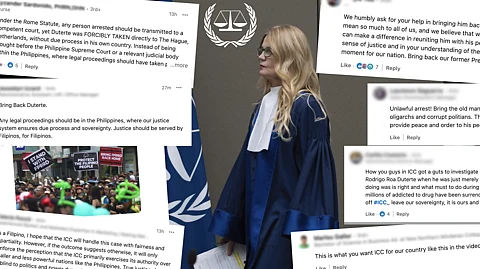
- NEWS
- the EDIT
- COMMENTARY
- BUSINESS
- LIFE
- SHOW
- ACTION
- GLOBAL GOALS
- SNAPS
- DYARYO TIRADA
- MORE

MANILA, Philippines — In a curious display of online activism, supporters of former President Rodrigo Duterte have taken to social media—particularly LinkedIn—to flood posts related to his International Criminal Court (ICC) case with calls for his release. However, legal experts warn that such tactics might do more harm than good.
The digital barrage, particularly on posts by ICC Pre-Trial Chamber I Presiding Judge Iulia Motoc, has raised concerns that it could backfire on Duterte’s defense. While his loyalists seemingly hope to pressure the ICC, legal observers suggest this behavior might reinforce the perception that Duterte's influence extends beyond the Philippines—even reaching the court that is set to try him for crimes against humanity.
Kristina Conti, an assistant to counsel at the ICC, noted that while Duterte’s supporters may believe they are shaping public discourse, their online actions could ultimately work against him. She pointed out that the ICC judges may interpret these efforts—not just as passionate advocacy—but as an indication of the former president’s continuing influence, which could raise concerns about intimidation and interference in the legal process.
Similarly, ICC-accredited lawyer Joel Butuyan observed that both the social media campaign and street protests might affect Duterte’s request for interim release. He explained that ICC judges consider several factors when evaluating such requests, including whether the accused poses a flight risk, a threat to witnesses, or a risk of tampering with evidence. The recent political unrest and the highly organized nature of Duterte’s support base may lead the court to view these risks as heightened, making interim release less likely.
The ICC’s official LinkedIn page recently posted about Duterte’s first court appearance on 14 March, where it announced that the confirmation of charges hearing was scheduled for 23 September. The post quickly became a battleground for supporters and critics alike.
Some comments pleaded for Duterte’s freedom, while others encouraged the ICC to deliver justice. However, a portion of the replies turned hostile, with personal insults and even veiled threats—mirroring past online behavior during Duterte’s presidency.
But while these tactics might be effective in influencing domestic political discourse, they are unlikely to have any bearing on the ICC. The international tribunal, bound by strict legal frameworks and judicial independence, operates far differently from local political institutions, where public sentiment often sways outcomes.
Beyond the digital sphere, street protests have also erupted in the Philippines following Duterte’s arrest on 11 March at Ninoy Aquino International Airport. He was subsequently transported to The Hague, where he remains in ICC custody.
The ICC will weigh several factors in determining whether Duterte qualifies for interim release. Butuyan pointed out that if the judges see signs of unrest or continued influence from Duterte’s base, they may be even more reluctant to consider such a request.
“For any interim release plea to succeed, the accused must demonstrate that there’s no risk of witness intimidation, evidence tampering, or flight. Given the current atmosphere, I don’t think those conditions are being met,” he said.
As Duterte awaits his next court appearance, his supporters’ fervent online and offline activities may be sending the wrong message. If the ICC perceives these actions as intimidation rather than advocacy, it could make securing any form of leniency significantly harder for the former president.
